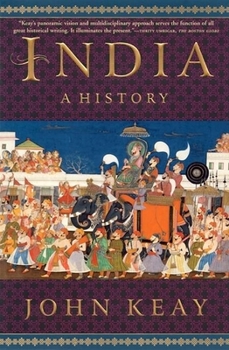India: A History
Select Format
Select Condition 
Book Overview
John Keay's India: A History is a probing and provocative chronicle of five thousand years of South Asian history, from the first Harrapan settlements on the banks of the Indus River to the recent nuclear-arms race. In a tour de force of narrative history, Keay blends together insights from a variety of scholarly fields and weaves them together to chart the evolution of the rich tapestry of cultures, religions, and peoples that makes up the modern...
Format:Paperback
Language:English
ISBN:0802137970
ISBN13:9780802137975
Release Date:May 2001
Publisher:Grove Press
Length:608 Pages
Weight:1.92 lbs.
Dimensions:1.3" x 6.0" x 9.0"
Customer Reviews
2 ratings
An excellent book for starting a study on Indian history
Published by Thriftbooks.com User , 20 years ago
Having read all the editorials and customer reviews of this obviously popular book, I realise that there is a great danger of letting one's personal view of history get in the way of an objective analysis of the contents of a books such as this. So let me say up front that I have no firm views on the provenance of Inidan civilisation, other than to say that I am attracted to the theory that the Indus civilisation is the forerunner of the later Indian civilisations. But holding that view doesn't necessarily make it so!My interest in history goes back to my college days, and I now have the time to read as much as history I can take. I have usually tended to concentrate on the Ancient Near East and Europe and those dark eras (such as Western Europe in 5th - 6th centuries AD, Ancient Near East in Late Bronze Age times, and the early civilisations prior to that) where documentary evidence is either sparse, contradictory, confusing, or downright incorrect. But I have never been totally satisfied with the explanations of how the early civilisations developed, and the impact of India on these early civilisations was an unkown to meOne of the problems I have in understanding these complex civilisations is how many of the theories are based on so few facts. I have read many books where the author has built hypothesis upon hypothesis to come up with conclusions which I, along with many others, find very hard to accept. These books are often very selective in their use of the facts and tend ro focus only on those which support their theories. This calls into question their objectivity, and so I usually suspend my judgement on their findings until I have searched out more hard data. Even so, they have usually served a useful function in forcing me to widen my search "for the truth" I accept the fact that there are historians and that there are scholars and that they have a different focus. For me a successful and respected historian (like John Keay) is best if he concentrates on a survey of what is known, what the various competing theories are, and how the available data has been interpreted to support these theories. For scholars it is different, because they are trying to discover and interpret more facts, and for that they must have some view or theory as to what happened. This is why I, as an amateur, must be ever watchful for the use of selective arguments, and the danger of theories developed on the basis of hypotheses built on other hypotheses. For me, the completeness and the correct interpretation of available data is very important.Like most westerners, my knowledge of India is very limited. Oh yes, I had learned about the Raj from my school days, and realise how British Empire centric it was. In recent years, as I read more about the Ancient Near East, the more I kept on picking up peripheral references to contacts with early India. So a book such as "Search for the Cradle of Civilisation" by Feuerstein, Kak, Fr
Superb General History of India
Published by Thriftbooks.com User , 24 years ago
This book is by far the best general history of India which I have found(I can only speak of English texts). Keay covers the full sweep of Indian history without spending two thirds of the book on the last two hundred years. Most other Indian historis focus too much on the colonial era. Moreover, when they describe pre-colonial times they mainly talk about the great "highpoints" such as the the Mauryan empire, the Gupta empire and the Great Moguls. Yet these highpoints only lasted for a small portion of the timeline of Indian history and usually left large portions of the subcontinent outside their way. The book has a superb graph which illustrates this point.Keay explicits states that he wants to avoid the common practice of treating Indian history as different. Most other histories deemphasize chronology and emphasize religion and society (especially the caste system). They almost treat India as timeless. While religion and society are very important topics, I found it very refreshing to read Keay's book with its greater emphasis on chronology. I strongly feel that he found a much better balance than I read in other popular histories of India.Keay expertly strings together the various threads of India's history. This is no easy task given what at times is a plethora of dynasties and rulers. He was able to strike a good balance in giving a lot of information, without making the text tedious. "India: A History" is a book of which I have already reread portions, and I am sure I will consult it many times in the future.






